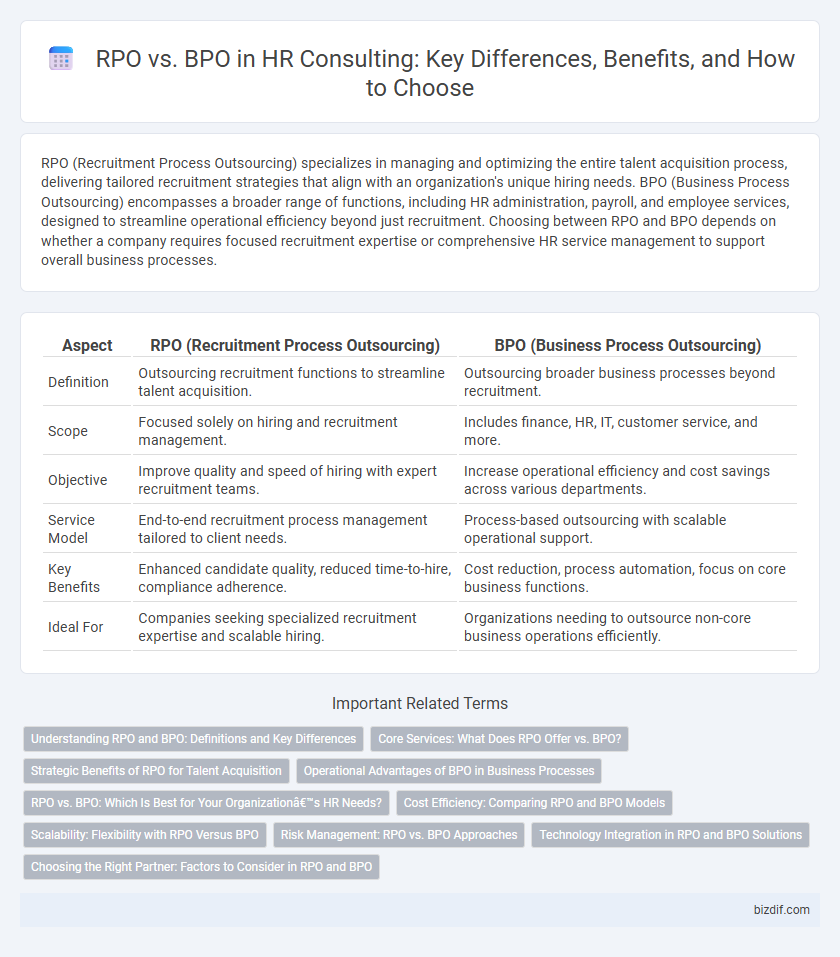RPO (Recruitment Process Outsourcing) specializes in managing and optimizing the entire talent acquisition process, delivering tailored recruitment strategies that align with an organization's unique hiring needs. BPO (Business Process Outsourcing) encompasses a broader range of functions, including HR administration, payroll, and employee services, designed to streamline operational efficiency beyond just recruitment. Choosing between RPO and BPO depends on whether a company requires focused recruitment expertise or comprehensive HR service management to support overall business processes.
Table of Comparison
| Aspect | RPO (Recruitment Process Outsourcing) | BPO (Business Process Outsourcing) |
|---|---|---|
| Definition | Outsourcing recruitment functions to streamline talent acquisition. | Outsourcing broader business processes beyond recruitment. |
| Scope | Focused solely on hiring and recruitment management. | Includes finance, HR, IT, customer service, and more. |
| Objective | Improve quality and speed of hiring with expert recruitment teams. | Increase operational efficiency and cost savings across various departments. |
| Service Model | End-to-end recruitment process management tailored to client needs. | Process-based outsourcing with scalable operational support. |
| Key Benefits | Enhanced candidate quality, reduced time-to-hire, compliance adherence. | Cost reduction, process automation, focus on core business functions. |
| Ideal For | Companies seeking specialized recruitment expertise and scalable hiring. | Organizations needing to outsource non-core business operations efficiently. |
Understanding RPO and BPO: Definitions and Key Differences
Recruitment Process Outsourcing (RPO) involves transferring all or part of recruitment activities to an external provider specializing in talent acquisition. Business Process Outsourcing (BPO) refers to contracting specific business operations, including HR functions, to third-party vendors for efficiency and cost reduction. Key differences lie in RPO's focus on strategic recruitment management, while BPO covers a broader scope of operational processes beyond hiring.
Core Services: What Does RPO Offer vs. BPO?
RPO (Recruitment Process Outsourcing) specializes in end-to-end talent acquisition solutions, including candidate sourcing, screening, onboarding, and recruitment strategy development tailored to the client's hiring needs. BPO (Business Process Outsourcing) offers a broader range of services beyond recruitment, such as payroll processing, employee administration, and HR compliance management. RPO focuses primarily on optimizing hiring efficiency and candidate quality, while BPO manages multiple HR functions to improve overall operational workflows.
Strategic Benefits of RPO for Talent Acquisition
Recruitment Process Outsourcing (RPO) enhances talent acquisition by providing scalable, specialized recruitment expertise tailored to organizational needs. It improves candidate quality and reduces time-to-hire through data-driven talent sourcing and advanced analytics. Strategic RPO partnerships integrate employer branding and workforce planning, driving long-term recruitment cost efficiency and talent retention.
Operational Advantages of BPO in Business Processes
Business Process Outsourcing (BPO) offers significant operational advantages by streamlining non-core business functions such as payroll, recruitment, and employee administration, allowing organizations to focus on strategic HR initiatives. BPO providers leverage advanced technologies and specialized expertise to enhance efficiency, reduce operational costs, and improve service quality in HR processes. This approach leads to scalable, flexible operations with faster turnaround times and compliance with regulatory requirements, driving overall business performance.
RPO vs. BPO: Which Is Best for Your Organization’s HR Needs?
Recruitment Process Outsourcing (RPO) focuses exclusively on managing and optimizing the hiring process, delivering specialized talent acquisition expertise to improve recruitment outcomes and reduce time-to-fill metrics. Business Process Outsourcing (BPO) covers a broader range of HR functions beyond recruiting, including payroll, benefits administration, and employee relations, offering comprehensive HR operational support. Organizations seeking targeted recruitment efficiency benefit most from RPO, while those needing end-to-end HR service management typically opt for BPO solutions.
Cost Efficiency: Comparing RPO and BPO Models
Recruitment Process Outsourcing (RPO) typically offers greater cost efficiency than Business Process Outsourcing (BPO) by streamlining talent acquisition and reducing recruitment overhead through specialized hiring expertise. RPO providers leverage advanced sourcing technologies and data analytics to optimize candidate quality and speed, lowering overall recruitment spend compared to broader BPO services that cover multiple operational functions. Companies seeking targeted cost reductions in hiring often find RPO to be a more scalable and measurable investment than general BPO contracts.
Scalability: Flexibility with RPO Versus BPO
RPO (Recruitment Process Outsourcing) offers scalable recruitment solutions by adjusting hiring volumes based on organizational needs, ensuring flexibility in talent acquisition without long-term commitments. BPO (Business Process Outsourcing) often involves broader operational functions with less agility, making scalability more challenging for dynamic workforce demands. Companies seeking rapid workforce expansion benefit from RPO's adaptable model, while BPO suits consistent, stable process outsourcing.
Risk Management: RPO vs. BPO Approaches
Recruitment Process Outsourcing (RPO) reduces talent acquisition risks by leveraging specialized expertise and advanced analytics to improve candidate quality and compliance. Business Process Outsourcing (BPO) manages broader operational risks, including payroll and HR administration, ensuring regulatory adherence and data security across multiple HR functions. RPO focuses on minimizing hiring risks, while BPO addresses overall HR operational risks through process standardization and scalability.
Technology Integration in RPO and BPO Solutions
Technology integration in Recruitment Process Outsourcing (RPO) leverages advanced applicant tracking systems (ATS), AI-driven candidate screening, and data analytics to enhance hiring efficiency and talent quality. In Business Process Outsourcing (BPO), technology focuses on streamlining broader HR functions such as payroll processing and employee administration through automated platforms and cloud-based solutions. Adopting tailored technology tools in both RPO and BPO drives operational excellence but varies in scope, with RPO emphasizing recruitment-specific innovations and BPO targeting comprehensive HR workflow automation.
Choosing the Right Partner: Factors to Consider in RPO and BPO
Selecting the right partner involves evaluating expertise in Recruitment Process Outsourcing (RPO) and Business Process Outsourcing (BPO), aligning service capabilities with your organization's talent acquisition goals. Key factors include technology integration, scalability, compliance adherence, and cost-efficiency tailored to recruitment or broader operational needs. Assessing vendor track records in industry-specific hiring and process management ensures optimal alignment with workforce strategy and business growth objectives.
RPO vs BPO Infographic

 bizdif.com
bizdif.com